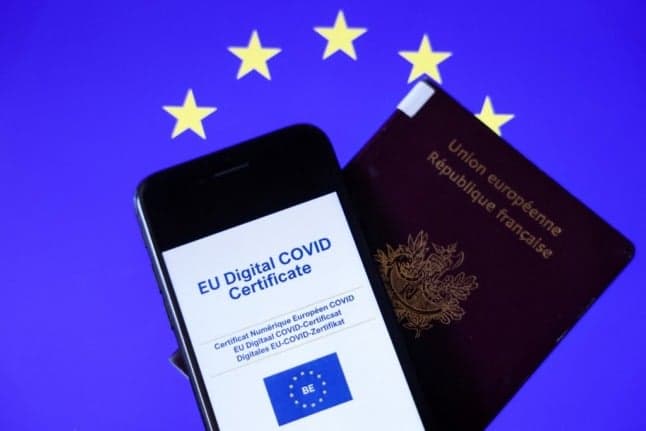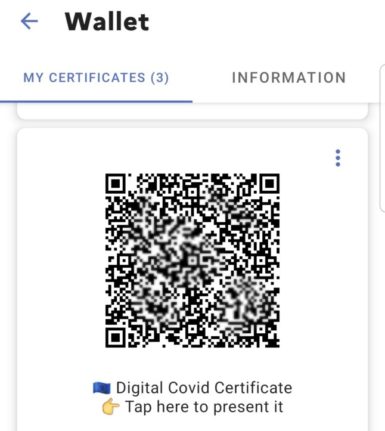EXPLAINED: What people vaccinated in France need to do to get the EU Covid travel certificate

Vaccine certificates that comply with EU travel passport requirements are now available in France - here's how to get one and what to do with it.
It was announced on Friday that travel vaccination certificates are now available - but what is the EU Covid certificate and how different is it from the French pass sanitaire?
Vous voyagez cet été ? Le certificat européen de vaccination #Covid_19 est dès à présent disponible ! Rendez-vous https://t.co/pqcIA8HJKL pour le télécharger 👍 pic.twitter.com/AGqyBndTxc
— Vite Ma Dose de Vaccin ! (@ViteMaDose_off) June 25, 2021
First of all, obviously you need to have been vaccinated.
Anyone who has completed their vaccination course in France should have an attestation de vaccination (vaccination certificate) with a QR code on it. People more recently vaccinated were given these at their appointment, others can download them via the Ameli site.
READ ALSO How to create an Ameli account
If you don't have one of these certificates, here is what to do.
Once you have the certificate, you can then either print it out or scan it into the French TousAntiCovid app and this creates the pass sanitaire which since June 9th has been needed to access large events such as concerts and festivals in France.
So what about travel?
From Friday, June 25th, a new certificate is available and it's this one that you need if you want to travel.
If you are vaccinated after June 25th your certificate will be EU-compliant, if you got yours earlier then you need to update it to ensure it can be scanned at the border.
For those who have an Ameli account this is pretty easy - head to attestation-vaccin.ameli.fr and log in with details from your Ameli account.
This should display a certificate entitled EU Digital Covid certificate, with your name and DOB and a QR code which you can download.
If you don't have a smartphone, you can print out the certificate to show at the border.
If you do have a smartphone, open up the TousAntiCovid app and go to the My Wallet section and scan in the code.
If should then appear with any other certificates - vaccine certificates or test results - that you have uploaded. The one for travel has the little EU emoji next to it.
If you have previously scanned in a vaccination certificate to the app, there should be an option to update it to the EU one in the app - open up the My wallet section of the app and find your certificate. If you tap on the three blue dots just above the QR code to the left, you will get an option to 'convert to European format' which will update your code.

For people who do not have an Ameli account, the advice it to take your current vaccination certificate to a vaccine centre, doctor or pharmacy and ask for the EU-compliant version. This does not need t be the centre where you were vaccinated.
A free telephone hotline is available between 9am and 8pm daily for anyone who has trouble downloading or using the health passport. The number is: 0 800 08 71 48
When can I use this?
Officially the EU’s Covid-19 certificate, as it’s properly known, launches across the bloc on July 1st.
From that date, people who can show they are fully vaccinated (ie two weeks after their second dose or four weeks after the single dose Johnson & Johnson vaccine) can travel anywhere within the EU or Schengen zone without needing to follow certain health measures, such as quarantining or testing.
Slightly confusingly, some nations already accept it. On Thursday, June 24th, Norway eased regulations to allow visitors from 12 EU countries to travel using the EU Covid certificate. For the rest, it will be available from July 1st.
Do I have to?
It is important to note that it is not a requirement for travel within the Bloc. But those who do not carry it will have to abide by any local Covid-19 laws in place for countries that they visit, including quarantine periods. They may also need to take tests to enter certain countries.
The certificate is intended to make such requirements unnecessary for holders.
The EU pass will be valid in: Germany, Austria, Belgium, Bulgaria, Cyprus, Croatia, Denmark, Spain, Estonia, Finland, France, Greece, Hungary, Ireland, Italy, Latvia, Lithuania, Luxembourg, Netherlands , Poland, Portugal, Czech Republic, Romania, United Kingdom, Slovakia, Slovenia, Sweden, as well as Switzerland, Iceland, Liechtenstein, Norway.
At present only vaccination certificates can be uploaded, but it is intended that by July this is extended to also create EU-compliant codes for negative Covid tests and certificates of recent recovery.
What if I was vaccinated outside France?
The French app at present only accepts French certificates but for travel purposes a vaccination certificate from any EU or Schengen zone nation will be accepted at the border.
The situation for people vaccinated in non EU countries is, at present, less clear.
Comments (10)
See Also
It was announced on Friday that travel vaccination certificates are now available - but what is the EU Covid certificate and how different is it from the French pass sanitaire?
Vous voyagez cet été ? Le certificat européen de vaccination #Covid_19 est dès à présent disponible ! Rendez-vous https://t.co/pqcIA8HJKL pour le télécharger 👍 pic.twitter.com/AGqyBndTxc
— Vite Ma Dose de Vaccin ! (@ViteMaDose_off) June 25, 2021
First of all, obviously you need to have been vaccinated.
Anyone who has completed their vaccination course in France should have an attestation de vaccination (vaccination certificate) with a QR code on it. People more recently vaccinated were given these at their appointment, others can download them via the Ameli site.
READ ALSO How to create an Ameli account
If you don't have one of these certificates, here is what to do.
Once you have the certificate, you can then either print it out or scan it into the French TousAntiCovid app and this creates the pass sanitaire which since June 9th has been needed to access large events such as concerts and festivals in France.
So what about travel?
From Friday, June 25th, a new certificate is available and it's this one that you need if you want to travel.
If you are vaccinated after June 25th your certificate will be EU-compliant, if you got yours earlier then you need to update it to ensure it can be scanned at the border.
For those who have an Ameli account this is pretty easy - head to attestation-vaccin.ameli.fr and log in with details from your Ameli account.
This should display a certificate entitled EU Digital Covid certificate, with your name and DOB and a QR code which you can download.
If you don't have a smartphone, you can print out the certificate to show at the border.
If you do have a smartphone, open up the TousAntiCovid app and go to the My Wallet section and scan in the code.
If should then appear with any other certificates - vaccine certificates or test results - that you have uploaded. The one for travel has the little EU emoji next to it.
If you have previously scanned in a vaccination certificate to the app, there should be an option to update it to the EU one in the app - open up the My wallet section of the app and find your certificate. If you tap on the three blue dots just above the QR code to the left, you will get an option to 'convert to European format' which will update your code.

For people who do not have an Ameli account, the advice it to take your current vaccination certificate to a vaccine centre, doctor or pharmacy and ask for the EU-compliant version. This does not need t be the centre where you were vaccinated.
A free telephone hotline is available between 9am and 8pm daily for anyone who has trouble downloading or using the health passport. The number is: 0 800 08 71 48
When can I use this?
Officially the EU’s Covid-19 certificate, as it’s properly known, launches across the bloc on July 1st.
From that date, people who can show they are fully vaccinated (ie two weeks after their second dose or four weeks after the single dose Johnson & Johnson vaccine) can travel anywhere within the EU or Schengen zone without needing to follow certain health measures, such as quarantining or testing.
Slightly confusingly, some nations already accept it. On Thursday, June 24th, Norway eased regulations to allow visitors from 12 EU countries to travel using the EU Covid certificate. For the rest, it will be available from July 1st.
Do I have to?
It is important to note that it is not a requirement for travel within the Bloc. But those who do not carry it will have to abide by any local Covid-19 laws in place for countries that they visit, including quarantine periods. They may also need to take tests to enter certain countries.
The certificate is intended to make such requirements unnecessary for holders.
The EU pass will be valid in: Germany, Austria, Belgium, Bulgaria, Cyprus, Croatia, Denmark, Spain, Estonia, Finland, France, Greece, Hungary, Ireland, Italy, Latvia, Lithuania, Luxembourg, Netherlands , Poland, Portugal, Czech Republic, Romania, United Kingdom, Slovakia, Slovenia, Sweden, as well as Switzerland, Iceland, Liechtenstein, Norway.
At present only vaccination certificates can be uploaded, but it is intended that by July this is extended to also create EU-compliant codes for negative Covid tests and certificates of recent recovery.
What if I was vaccinated outside France?
The French app at present only accepts French certificates but for travel purposes a vaccination certificate from any EU or Schengen zone nation will be accepted at the border.
The situation for people vaccinated in non EU countries is, at present, less clear.
Join the conversation in our comments section below. Share your own views and experience and if you have a question or suggestion for our journalists then email us at [email protected].
Please keep comments civil, constructive and on topic – and make sure to read our terms of use before getting involved.
Please log in here to leave a comment.